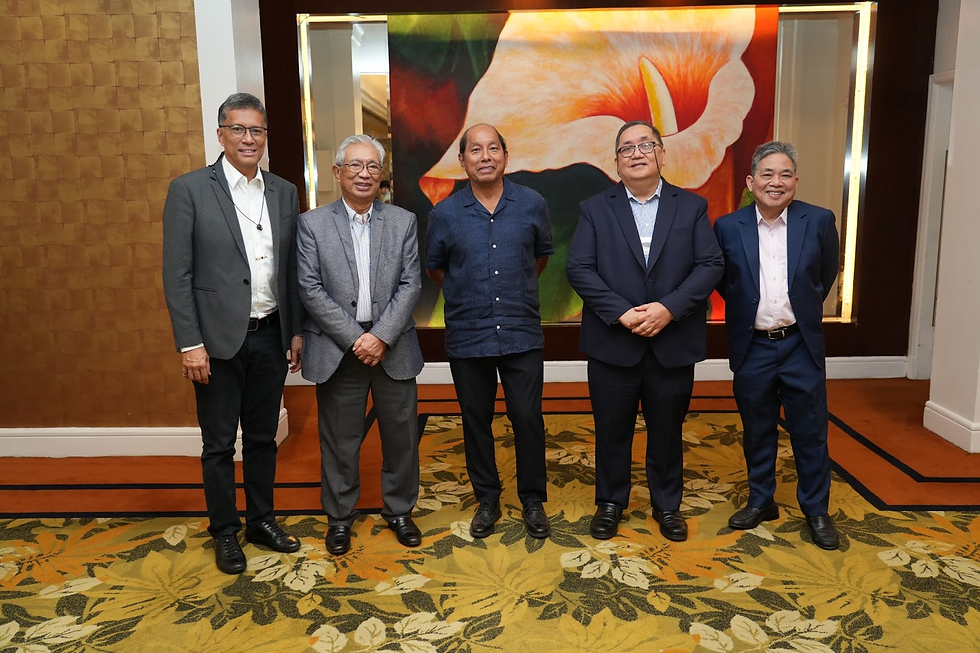TAKE YOUR TIME, MR. PRESIDENT
- Action for Economic Reforms
- Dec 19, 2018
- 4 min read
YELLOW PAD
By Jo-Ann Latuja-Diosana
The Tax Reform for Acceleration and Inclusion bill (TRAIN) is at the final stages of becoming a law. Last December 13, the Senate ratified the Bicameral Conference Committee report (Bicam) on TRAIN with a 16-4 vote. The House of Representatives also claims that it has already voted for the bill through viva voce. President Duterte is scheduled to sign it into law this week. The TRAIN is about to leave.
While many of the measures included in TRAIN are long-overdue reforms that should no longer be delayed, I strongly urge the President to take his time to ensure that everything is in order. After all, TRAIN will significantly influence our country’s economic policies and development in the next 10 to 20 years. Hence, it is only prudent to check that all its parts match, and are intact and in place, and that no one will be left behind.
With questions on quorum and proper observance of House rules surrounding the ratification of TRAIN in the House, the President’s first order of business should be to secure the validity of the passage of the law. All efforts will be for naught and no reform will take place if complaints against its enactment are filed at the Supreme Court.
Once that it settled, the President must then focus on reviewing the bad parts of TRAIN that can still be rectified through his power to veto certain provisions in a revenue bill. While the Senate-ratified TRAIN version gives much-needed relief to salaried workers and entrepreneurs, rightly adjusts excise taxes on fuel, automobile, coal, and mining, and rationalizes VAT exemptions by lifting some that are unnecessarily granted to certain sectors, it also introduces new sources of leakage and provisions that are detrimental to health and the lives of the Filipino people.
A top priority should be the line-item veto of the entire Section 42 of the bill, which increases the excise tax on cigarettes by a measly average of P1.67 per year until 2023 and has an effect of removing the dedicated funding for universal health care. The said section is neither in the House nor the Senate version of TRAIN. How it was underhandedly inserted in the Bicam also poses questions on its validity. Moreover, the low tax rate will not only be causing 750,000 Filipinos to become new smokers and more lives lost to tobacco-related diseases in the future but also take away the opportunity of securing funds for the full realization of universal health care (UHC). Settling at this excise tax rate and its promised additional revenue of P4 billion is a far cry from the proposal of health advocates, including former finance officials and economic managers, to increase the cigarette tax from P30 today to P60 in 2018. This proposed doubling of the excise tax on cigarettes, which can generate P50 billion to P60 billion in the first year alone, can easily finance the P67 billion per year requirement for expanding and strengthening UHC in the next five years.
Inasmuch as the earmarking of incremental revenue from TRAIN will only be 30% for a long list of programs, including those for the advancement of the livelihood of sugar farmers, the targeted cash transfers program to aid the seamless transition of the poor and vulnerable households to the new tax regime, other social mitigating measures, and investments in education and health, it is difficult to imagine how UHC can be sustained even by the entire TRAIN.
For the targeted cash transfers alone, the government will be needing P38.6 billion next year, which is already way above the P27.7 billion earmarked fund or 30% of the P92.3 billion total additional revenue expected from TRAIN in 2018.
The President’s intervention will also be helpful in preventing further weakening of the VAT system. The insertions of Senator Sonny Angara under Sections 31 and 32 of the bill, which explicitly grant VAT zero-rating to transactions with PEZA- or TIEZA-registered entities, should also be vetoed as these will abet the creation of more anti-poor, anti-indigenous people, and APECO-like zones in the country, whose contributions to local economic development have yet to be established despite the billions of government money that have already been spent on them.
New exemptions from VAT that are included in the ratified TRAIN, such as on the sale of drugs and medicines under Section 35 of the bill, should also be struck out as this will benefit the drug companies, distributors, and retailers more than the final consumers.
Upon receipt of the ratified TRAIN, President Duterte will have 30 days to communicate his veto of any of its provisions before it becomes a law as if he had signed it. Thirty days is sufficient time to analyze the legislative process, rectify what needs to be rectified, understand the implications of dubious insertions, and strike out provisions that will do more harm than good.
These last days will be critical in ensuring that the health of the Filipino people will be protected, that the poor and the vulnerable will continue to experience increasing access to affordable and quality health care through UHC, and that public interest still has a fighting chance over vested interests.
Mr. President, please do not rush and take all the time that you need to rectify TRAIN so that it stays true to its original intent. Let us give relief to our workers at the soonest, but let us not leave behind the poor and the vulnerable, whose basic health needs are now being jeopardized by last-minute insertions of legislators protecting vested interests.
The TRAIN is about to leave. Let’s make sure that its track is secured and no one is left behind.
Jo-Ann Latuja-Diosana is a trustee of Action for Economic Reforms.



